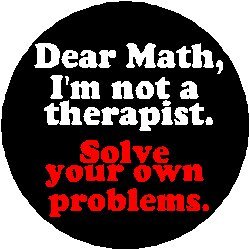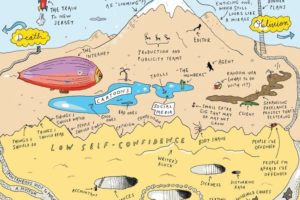In my quest to explore the background of Philo of Alexandria’s thoughts on education, I came across one of the most influential individuals to every write on the subject, Plato. Philo was a notorious propagator of Platonic thought. In fact, many scholars consider the Jewish theologian one of the most essential voices of what has been referred to as Middle-Platonism. I’m a big fan of Philo, so much so that I wrote my PhD thesis on his understanding of the concept of paideia. I could go on and on about how awesome he was but this post is about Plato, so, with a mind wrenching return to purpose, I’ll stop this potential tangental ramble and move on to Plato.
Anyway, I have been reading up on Plato’s view of education and, much to my chagrin, I fall hopelessly short in his understanding of a properly educated person.
First of all, it’s painfully obvious, in several of Plato’s writings, that this esteemed philosopher placed a very high emphasis on mathematics. I didn’t appreciate mathematics even a tiny bit during my undergrad days and ran away from formal expressions of this subject as quickly as possible. I escaped straight into the liberal arts where my university math courses consisted of only two things: Intermediate Algebra and Math Appreciation.
I adeptly avoided the former by finding a little known loophole in the course catalog. I had to take the latter, which consisted of some kind of math-is-the-universal-language rhetoric. It was taught by a visiting Russian professor with such a thick accent that no one was able to comprehend what she was trying to teach. She eventually gave up communicating anything of significance and finished out the semester by showing us a cadre of videos about how great math was. Needless to say, the only thing I ended up appreciating was…. well… (you’ve probably guessed it by now)… nothing.
Plato would have been aghast at my lack of education! In fact, his emphasis on math seems a little extreem to me. But, then again, he didn’t have the luxury of graphing calculators, super computers, and ipad apps to contribute to the mathematical apathy I experience today.
So what does Plato’s ideally educated person consist of? Well, since you asked… Plato laid down quite a bit of his educational theory in The Republic, his work concerning the ideal city state. (Education in Plato’s Republic and Aristotle’s Politics by A.W. Nightingale was very helpful in outlining all of this.)
It appears that Plato had two stages of education in mind when he wrote The Republic.The first stage focused on the student’s ability to imitate an appropriate model. It was mainly designed for those who were under 20 years old. Plato understood that, by imitating a good model, the student would absorb virtuous patterns into their own lives and create harmony in their own soul. This kind of imitation freed the “lower parts” of the soul to govern the human tendency and enticement towards the irrational. It also prepared an individual for good action that practically worked itself out in the development of good habits and good character. Little did I guess, as I read about this stage of education, that Plato would relate a lot of this to math!
The Second Stage of Plato’s ideal education of an individual is designed to mold a person into a Philosopher. This stage focuses on a student’s intellect and ability to engage in deep contemplative thought when focusing on a certain thing. This contemplation should achieve a depth that it transcends the thing itself, recognising the form existing behind the object of contemplation. “It is only philosophic education that can ‘draw the soul away from the world of becoming and towards true being’ (521d), thus turning it in the proper direction.” (Nightingale, 145)
In this stage of education, which begins at the age of 20, the idea of a performance based political life is snubbed in favor of philosophical contemplation. Through the educational disciplines (which consist of quite a lot of math, see below), reason permeates the soul and shapes it towards preexisting knowledge. In effect, what Plato calls “the eyes of the soul” are trained to look away from the world and recognize the forms behind creation. Unlike other virtues that are created by habit and practice, reason has a permeant place in the soul. “But the excellence of thought [Reason], it seems, is certainly of a more divine quality, a thing that never loses its potency, but, according to the direction of its conversion, becomes useful and beneficent, or, again, useless and harmful.” (Rep. 518e)
Practically, this shaping takes part through the 5 educational disciplines: (1) Numbers and Calculation, (2) Plane Geometry, (3) Solid Geometry, (4) Astronomy, and (5) Harmonics. Each discipline consists of memorising mathematical strategies and is designed to help an individual gain a perspective of the form behind objects that can be observed by the senses.
After mastering these five disciplines at the age of 30, the individual prepares for the pinnacle of their education, the discipline of Dialectic (Rep. 532a- ff.) “This, then, at last, Glaucon,” I [Plato] said, “is the very law which dialectics recites,the strain which it executes, of which, though it belongs to the intelligible, we may see an imitation in the progress of the faculty of vision, as we described its endeavor to look at living things themselves and the stars themselves and finally at the very sun. In like manner, when anyone by dialectics attempts through discourse of reason and apart from all perceptions of sense to find his way to the very essence of each thing and does not desist till he apprehends by thought itself the nature of the good in itself, he arrives at the limit of the intelligible, as the other in our parable came to the goal of the visible.” (Rep. 532b) Through the discipline of dialectic, founded in mathematical principles of observation, an individual can become a philosopher and is able to begin to give an account of the essence of things.
As I stated before, I was not, am not, and never will be a mathematician! In fact, when my youngest son brings home his 5th grade math homework, I have no clue how to help him! Thank God for people that are good at math and are only a phone call or Face time session away!
So, by Plato’s standards, I would have a pretty poor background to engage in the art of philosophy. But, let’s not miss the main point here. Plato understood mathematics as a means of preparing the soul to see beyond what the senses can perceive. When you think about it, it’s kind of like taking a written story and reading between the lines… or maybe more like reading above, below, between, and all around the lines.
All this required training in mathematical equations and geometric measurements helped prepare the individual to recognize what Plato deemed the world of forms (wikipedia that one if you dare!!). So, as long as I have access to some fancy iPad app to compute mind numbing math problems on my behalf, I think I’ll be just fine. I’ll save my brain for heavy duty contemplation and deftly continue to bypass the need for math itself.
Would Plato have approved? Probably not. However, I’m pretty sure that I can still contribute to a philosophical discussion, despite my failure to be properly educated. If this doesn’t work out I can always become a politician. In the US, this vocation doesn’t seem to require contemplative efforts or mathematical aptitude.





Leave a Reply
Your email is safe with us.